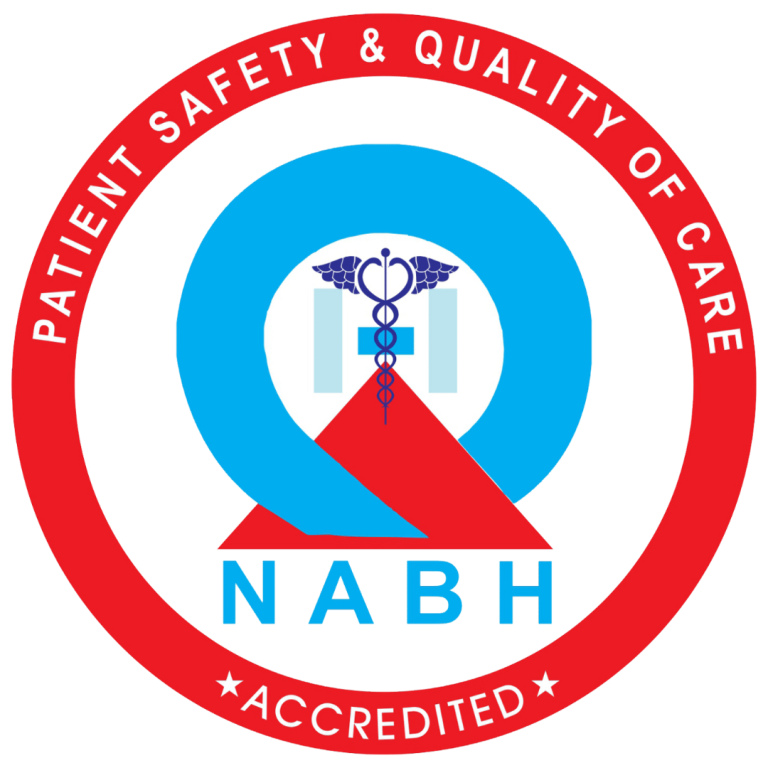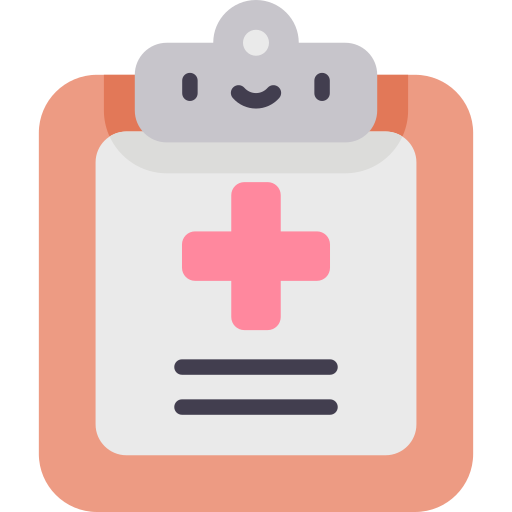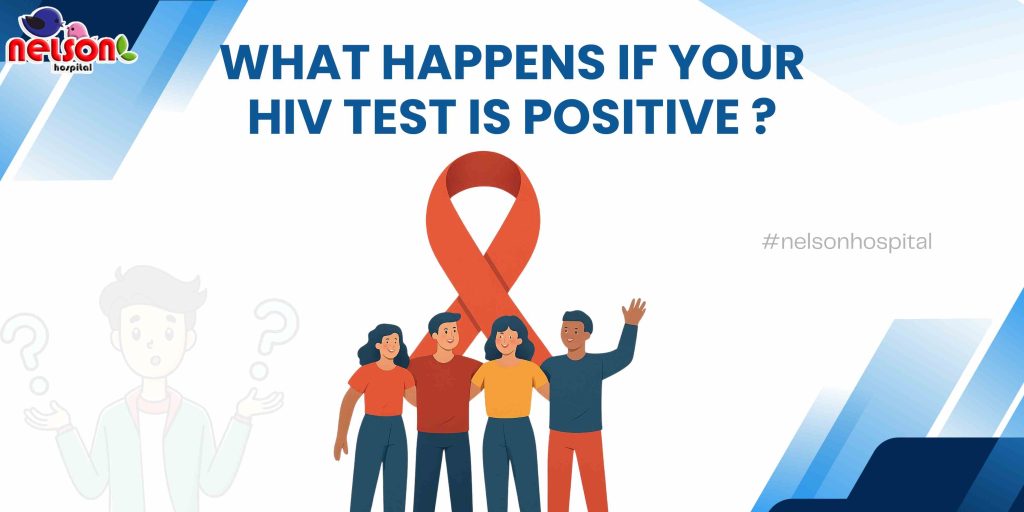
What happens if your HIV test is positive? What are the next steps?
Receiving a positive HIV test result can be emotionally overwhelming. But it’s important to understand that HIV is manageable with early diagnosis, timely treatment, and lifestyle adjustments. At Nelson Hospital, we’re committed to helping patients live full, healthy lives with the right medical support.
In this blog, we’ll explain what HIV is, how it spreads, symptoms to watch for, preventive measures, and most importantly, what to do next if your HIV test is positive.
What is HIV?
HIV stands for Human Immunodeficiency Virus. It attacks the body’s immune system—specifically the CD4 cells (T cells)—which help the body fight infections. If not treated, HIV can lead to AIDS (Acquired Immunodeficiency Syndrome), the final stage of HIV infection.
While there’s no cure for HIV yet, with proper antiretroviral therapy (ART), people with HIV can live long, healthy lives and even prevent transmission to others.
How Does HIV Spread?
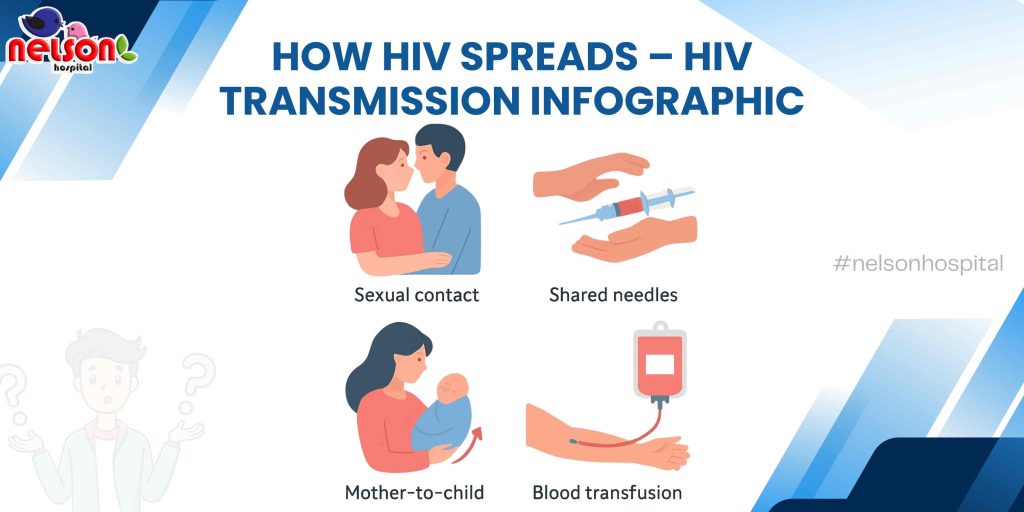
HIV spreads through the exchange of certain body fluids such as blood, semen, vaginal fluids, rectal fluids, and breast milk. Common transmission methods include unprotected sex, sharing needles, blood transfusions with infected blood, and from mother to child during childbirth or breastfeeding if not properly treated.
HIV is transmitted through bodily fluids, including:
- Blood
- Semen (cum) and pre-seminal fluid
- Vaginal fluids
- Rectal fluids
- Breast milk
Common ways HIV is spread:
- Unprotected sex with an HIV-positive person
- Sharing needles or syringes
- Blood transfusions (very rare with modern screening)
- From mother to baby during childbirth or breastfeeding (if untreated)
Symptoms of HIV
HIV symptoms vary depending on the stage of infection. Some people may not experience symptoms for years. However, typical symptoms include:
Early Stage (Acute HIV Infection)
- Fever
- Fatigue
- Sore throat
- skin rash
- Swollen lymph nodes
- Muscle or joint pain
These symptoms often appear 2–4 weeks after exposure and can resemble a common viral illness.
Chronic Stage (Asymptomatic)
- No symptoms but the virus is still active
- This stage can last for years if untreated
Advanced Stage (AIDS)
- Rapid weight loss
- Frequent fever or night sweats
- Long-term fatigue
- Prolonged swelling of lymph glands
- Chronic diarrhea
- Skin rashes or lesions
Steps to Take If Your HIV Test is Positive
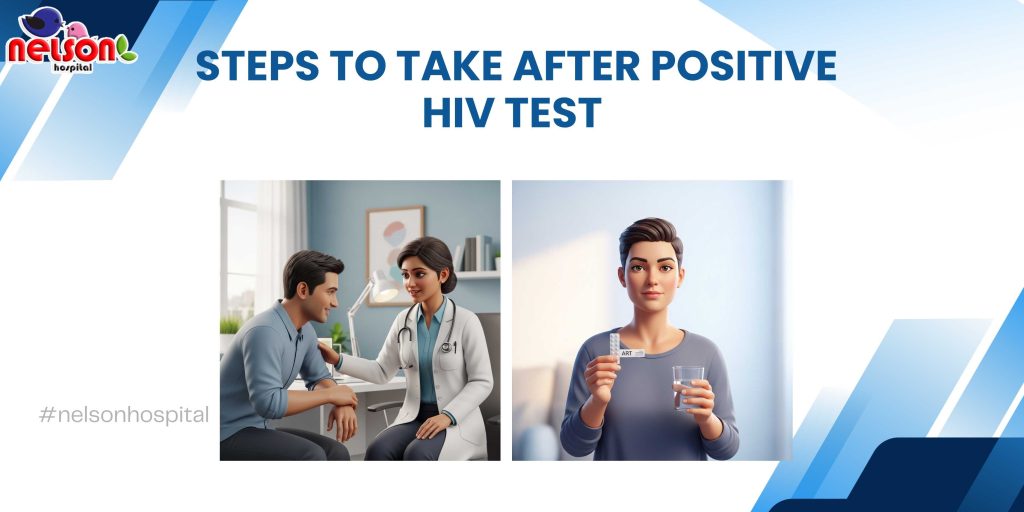
If your HIV test is positive, stay calm and get a confirmatory test. Start antiretroviral therapy (ART) immediately, follow a healthy lifestyle, and attend regular checkups. Protect others by practicing safe behaviors and seek emotional support. Early treatment and care can help you live a long, healthy, and fulfilling life.
Getting a positive result doesn’t mean the end of life. Here’s what you should do:
1. Confirm the Diagnosis
- A single positive result requires confirmatory testing.
- At Nelson Hospital, we follow strict diagnostic procedures to ensure accuracy.
2. Start Antiretroviral Therapy (ART)
- ART helps control the virus and strengthens the immune system.
- It reduces the viral load to undetectable levels, preventing transmission to others.
3. Follow a Healthy Lifestyle
- Eat a balanced diet
- Avoid alcohol and smoking
- Get regular exercise
- Manage stress
4. Protect Others
- Always use protection during sex
- Avoid sharing needles
- Follow guidelines during pregnancy to prevent transmission to the baby
5. Monitor Your Health Regularly
- Regular CD4 count and viral load tests help track your progress
- At Nelson Hospital, we offer complete monitoring and follow-up care
6. Get Emotional Support
- It’s normal to feel fear, guilt, or anxiety
- Talk to counselors or join support group
- Nelson Hospital provides compassionate psychological care along with treatment
How to Prevent HIV
Preventing HIV involves practicing safe sex by using condoms, getting tested regularly, and avoiding sharing needles or syringes. HIV-negative individuals at high risk can consider taking PrEP (Pre-Exposure Prophylaxis). For HIV-positive individuals, sticking to antiretroviral therapy (ART) and maintaining a low viral load helps prevent transmission to others.
Whether you’re HIV positive or negative, HIV prevention is critical for your health and others around you.
For HIV-Negative Individuals:
- Always use condoms
- Get tested regularly
- Avoid sharing needles
- Consider PrEP (Pre-Exposure Prophylaxis) if you’re at high risk
- Ensure blood transfusions are from screened sources
For HIV-Positive Individuals:
- Stick to ART regimen strictly
- Use protection during sex
- Inform your partners responsibly
- Do not breastfeed if you’re HIV positive and not under treatment
How Nelson Hospital Can Help
At Nelson Hospital, we provide:
- Accurate testing & diagnosis
- Advanced ART treatment plans
- Personalized nutrition & lifestyle guidance
- Mental health counseling
- HIV prevention education
- Safe pregnancy support for HIV-positive mothers
We believe that awareness, acceptance, and action are the keys to living well with HIV. You are not alone—we’re here every step of the way.
Final Thoughts
Testing positive for HIV can feel life-altering, but modern medicine and proper care have transformed HIV from a deadly virus to a manageable chronic condition.
If you or a loved one is facing a positive HIV result, remember:
- Get confirmed diagnosis
- Begin immediate treatment
- Maintain a healthy lifestyle
- Stay mentally strong and supported
- Follow regular health checkups
Book an Appointment


